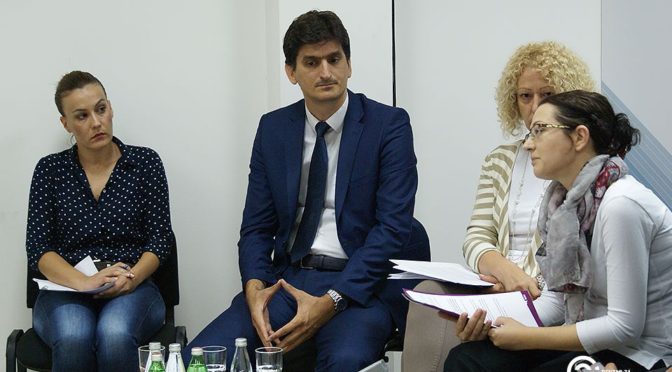Influence of civil society organizations (CSO) in decision making processes in Montenegro is limited and can be described rather formal than substantial.
The Civil Society Organization Sustainability Index (CSOSI) is analytical instrument that measures the progress of the civil sector in Central and Eastern Europe and Eurasia.
Index examines the overall environment for the development of civil society, focusing on legal environment, organizational capacity, financial viability, advocacy, service provision, infrastructure, and public image.
The CSOSI for Central and Eastern Europe and Eurasia, produced by the U.S. Agency for International Development (USAID) with partners in each participating country, assesses progress in the development of nonprofit, civil society organizations (CSO) in 24 countries of the region.
The country report for Montenegro was presented today by Center for Democratic Transition – CDT who participated in the country report development.
Each dimension is scored from 1 to 7 where 1 indicates the highest level of sustainability and development while 7 indicated the lowest level.
Overall CSO sustainability for Montenegro (4.0) remained the same fourth year in a row. Comparing to the countries in the region situation is worse only in Serbia.
Legal environment rated high
2015 CSOSI Montenegro rated with highest scores legal environment (3.5), advocacy (3.5) and infrastructure (3.8), while lower rated are public image (4.2) and organizational capacities (4.2).
Financial viability was assessed with the lowest score (5).
The USAID report states that there is no full application of the Law on NGOs.
CSOs generally enjoy the freedoms and legal guarantees necessary to carry out their work without political or institutional interference in the previous years there were reported cases of pressures on some CSOs.
When it comes to organizational capacity, the report states that there are no official data on the income of organizations, qualification of employees, salaries, and number of volunteers:
“Few CSOs have democratic governance structures or functional internal management structures. Instead, one or two leaders typically make all decisions.”
When it comes to financial viability, most organizations are still highly dependent on funding from international donors:
“Allocation of funds, especially on local level, is not transparent and personal relationships—rather than the quality of projects—are still the primary factor in funding decisions.â€
Individual philanthropy, in-kind support, volunteerism, and corporate social responsibility remain underdeveloped in Montenegro.
Public image of CSOSs remained unchanged in 2015: “Many still perceive CSOs as the government opposition, mainly because they criticize government activities and policies.â€
U.S. supports Montenegro’s efforts
During the presentation of the report Bix Aliu, Deputy Chief of Mission of the U.S. Embassy in Podgorica said that the authorities and the public should recognize the important role of civil society and an enabling environment for the implementation of their activities should be created.
“The Government of Montenegro has taken progressive steps to create an enabling environment for the work of civil society,” said Aliu.
Ivan Šikmanović from the Ministry of Interior believes that the key challenges hindering the relationship and cooperation between institutions and civil society organizations are issue of financing projects and programs of CSOs, as well as institutional framework which is important for cooperation.
“In the upcoming period it is essential to strengthen the capacity of the Office for Cooperation with NGOs, capacity building of the Ministry of Interior for creation of public policies, as well as strengthening the capacity of the Council for NGOs”.
Commenting on the Index assessment that philanthropy and volunteerism in Montenegro is underdeveloped, Anica Maja Boljević from Fund for Active Citizenship – FAKT believes that culture of giving needs to be developed to support voluntary actions for the common good.
Danijela VujoÅ¡ević from Center for Democracy and Human Rights – CEDEM considers that the public image and trust in NGOs has increased due to enhanced use of new media and increasing visibility of the activities carried out by CSOs.



